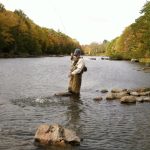Sandy and Ole Jaeger
"Get Out the Vote!"
According to census data, the voting rate has dropped by more than 10 percent over the last 25 years. Fewer 20-year-olds vote than 30-year-olds, and fewer 30-year-olds vote than 40-year-olds, and fewer 40-year-olds than 50-year-olds—and this trend continues. Electing the people who represent our values does matter. NRCM members Sandy and Ole Jaeger told us why they encourage their children and grandchildren to make it to the polls to vote for the environment and more:
“In 1950, I went with my dad out on the sound truck as it wended its way along the streets of Brooklyn, New York. I can remember holding the bullhorn and shouting. By 1952, when I was 16, my Republican dad ran for State Senator in a very Democratic district and although defeated, he garnered more votes than Eisenhower. I was involved in every aspect of that election.
“Ole was five years old in Denmark when the Nazis invaded his country, and the five years he lived under their threat has made him keenly sensitive to the horrors of living under fascism. His dad, Hans Henrik, had been a community activist and served as a Councilor in Blahoj.
“Given our backgrounds, it can be no surprise that from the time we married in 1960, we understood that we had an obligation to never take our lives for granted and had a responsibility to always participate in our democracy and work hard for the issues that we care about: the environment, poverty, civil rights, education, and so much more. Our four children came with us to meetings and joined us in voting booths. Our grandchildren haven’t escaped, either. My grandson, Zach, said in a recent email, ‘you explained to me in GREAT detail about the importance of voting.’ And, grandson Hale was not surprised when I called to find out if he was voting from his college town or absentee from his home town. I asked him to speak to all of his friends at school and encourage them to vote. I even emailed Burke (age 16) to say that even though he can’t vote I hoped he would speak to friends and family about the importance of casting their ballot in these difficult times.
“Our motto has long been Edmund Burke’s, ‘All that is necessary for the triumph of evil is that good men (and women) do nothing.’”
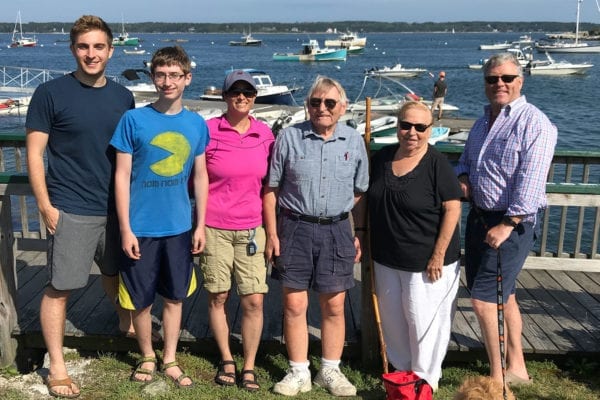
Pass It On!
Visit our Take Action page with your child, grandchild, or someone else in the next generation and together, contact at least six decisionmakers about pressing environmental issues during our 60th anniversary year!
Introduce the Democratic Process
When it comes to environmental issues in Maine, NRCM is quick to deliver well-researched fact sheets and information about how best to reach decisionmakers. We also host an annual State House Action Day that matches Mainers up with their legislators to start conversations about critical environmental issues. It’s possible that you have shown up, have made phone calls, and/or have sent emails. Sharing these opportunities with our children and our grandchildren strengthens the next generation of environmental activists. Sandy Jaeger told us about her children’s activism:
“It is only natural that our children absorbed our activism into their lives and without knowing or planning for it, found causes of their own. Anna Sofia, our youngest, remembers coming to the Board of Education to argue for the inclusion of sex education into the high school curriculum. Carl (our second) joined a high school investigation into problems within his school, served on the Board of ACLU, did a 500-mile bike ride to raise funds for AIDS, helped elect the new Mayor in San Francisco, and is a prolific writer of letters to the editor. All four remember helping to develop an organization (PRIME) created to keep music in the schools. They all ran around neighborhoods putting up posters, created a music festival, supported candidates, etc., and all four remember working hard to elect local candidates.”
Kelly Corbin
"Pass on Philanthropic Values"
According to research by the Women’s Philanthropy Institute, working-age adults today are donating far less of their incomes to charitable organizations than were working-age adults 30 years ago. Their research also found that adult children whose parents give to charity are more likely to give themselves. NRCM member Kelly Corbin shared with us how her mother influenced her philanthropy:
“My mother has always given to large, national-level conservation organizations, so I learned early on that donating was a good thing to do. She even managed to talk my grandfather, who was not at all an environmentalist, into giving to some of those organizations as well. He was a birder, and she convinced him that protecting habitat was critical. My husband and I talk often about who to support and why; we try to support organizations at different scales, from local to national to international, largely focused around education and the environment. We want to support not just organizations that are protecting the natural world, but also organizations dedicated to getting people out in nature so that more people become stewards.”
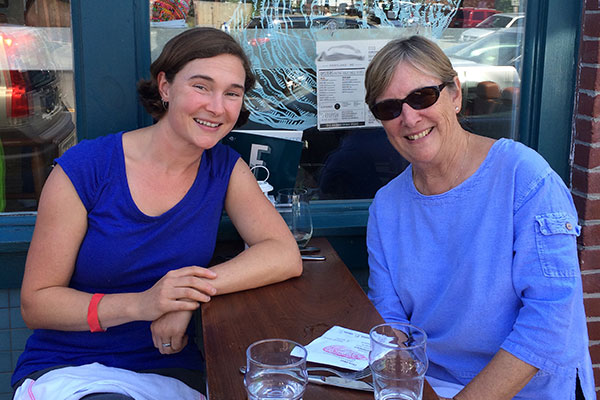
Ryan Linn
"Talk about Living Sustainably"
Marketing firm DDB Worldwide found in a survey of 6,000 US consumers that more Baby Boomers (born 1946-1964) recycle than Millenials (born 1977-1994). Interestingly, that same study noted that younger generations are more apt to use a refillable water bottle and own a hybrid or electric car. Talking about personal environmental choices that add up to big results can change habits across multiple generations. NRCM member Ryan Linn told us this:
“I recycle or reuse just about anything I can, and compost almost everything else. Living in the city where I can walk or bike almost everywhere I need to go helps a lot, too. I do end up driving to the mountains somewhat frequently, but at least those are almost all highway miles so I can be as fuel-efficient as possible when I do end up in the car. And, of course, I just like to own as little stuff as possible, so I end up with less waste. My mom (NRCM member Penny Linn) definitely introduced me to a lot of what I do (composting, recycling, and owning less are easy to point to her influence). Pretty much everything else can be attributed to great teachers and lots of time spent walking around in the mountains of Maine!”
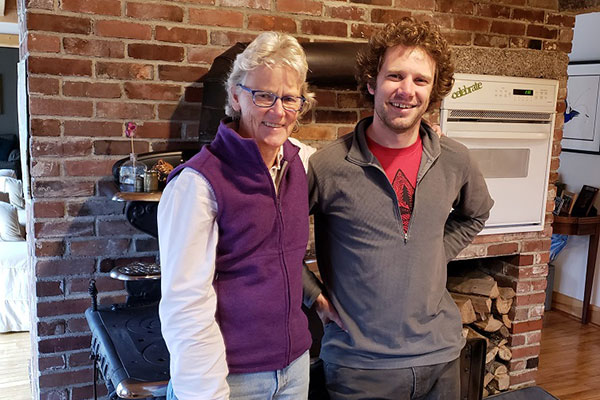
Pass It On!
In honor of our 60 years protecting the nature of Maine, here are 60 tips to get you started in reducing your impact on the planet. Choose some that are especially inviting for kids and make time to try them together. Here are some to get you started:
- Keep a reusable straw handy at home, the office, and in lunch boxes. Millions of disposable straws are used each day, polluting the environment and harming wildlife.
- Use weather stripping around the house to keep out drafts and reduce energy use by as much as 25 percent. A great project that kids can help with!
- When dining out, bring your own “doggy bag” for leftovers.
- Have a snack before leaving the house—shopping on an empty stomach can make any food seem too good not to buy.
Mariana Tupper
"The Food and Landscape Connection"
When Mariana Tupper shared her perspective with us she noted, “Certainly our opinions about landscapes are influenced by our experiences. Opinions in my own family have historically run strong on the topics of food and real estate.” It’s no wonder Mariana developed an “edible wild plants” perspective on the environment:
“Don’t worry! I did not start eating my way into our public lands. I soon learned that some plants are rare, some are difficult to identify, and others are poisonous—especially if you eat the wrong part at the wrong time of year. Moreover, all ’food plants’ are toxic if they grow on land and in water that has been polluted by pesticides and herbicides. Witness the ’birth’ of a 1970s ecologist! I was lucky that my parents took my siblings and me camping and shared with us their interests in plants, wildlife, and the Maine coast. I hope all families have the opportunity to at least gaze at the stars. As the astrophysicist Neil DeGrasse Tyson wrote, ‘We are one with the rest of nature, fitting neither above nor below, but within.’ Nowadays, my own focus is on the next generation. I am particularly pleased that my daughter knows how to make Dandelion Fritters!”
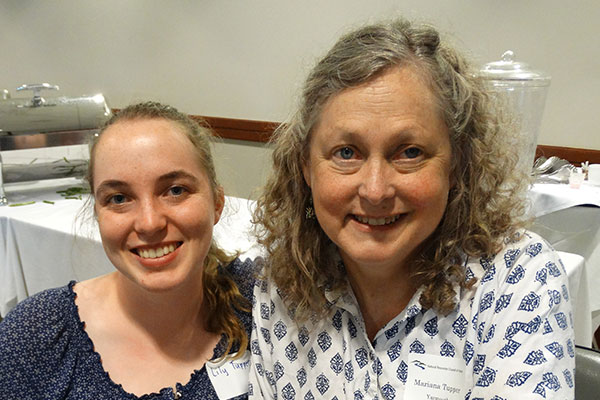
Pass It On!
Request six copies of NRCM’s School Food Waste Recovery handbook and take it to schools in your area (or beyond). Remind the administrators that stewardship of our natural world is an important educational value, and addressing the problem of food waste saves schools money while teaching the next generation that there are real actions they can take to help protect nature. Bonus Action: Encourage your contact person to reach out to us so we can help their school—and the children in it—get started!
Peggy Schuler
"Get the Next Generation Outside"
In neighborhoods across Maine something is missing that was there 30+ years ago—children! One sure way to ensure that the natural world is protected for years to come is to immerse children in it now. If we interrupt the electronics and take kids hiking, paddling, or identifying edible wild plants, trees, and animals, they will probably thank us one day, and the nature of Maine will be all that much better for it. Member Peggy Schuler shared with us why she hikes with her family.
In the 1950s, Peggy’s parents came back from WWII where they both worked in the medical field. They moved to Maine for its tranquility and natural beauty. Peggy grew up hiking, canoeing, and gardening with her dad and reading books with her mom. As well as a love of nature, Peggy’s family was also very involved with the organic farming movement, encouraging sustainable farming methods and the kind and ethical treatment of animals—another great way to be outside, she notes, adding that saving nature means not using poisonous chemicals on crops, fields, and forests—an important learning activity for adults and children alike.
She remembers a time when people would work all week and then on the weekend be so happy to simply get out in nature or travel to a beautiful park to enjoy hiking, swimming, and fishing. It was what people did with their leisure time that led people of any political stance to treasure the natural world and want to protect it.
Peggy is concerned that protecting the environment has become such a polarizing issue today, and that science is so easily dismissed. Science, medicine, history, and philosophy are very important subjects to consider with family as we live on this amazing and diverse planet, she points out. One way that she, herself, passes on strong environmental values is by getting out in nature with her children and grandchildren. Her family’s leisure time spent hiking today is ensuring the next generation of environmental stewards, just as hiking, gardening, and fishing served to do 60 years ago for Peggy, who jokes, “The children used to have to keep up with me. Now, I may be at the back of the pack but they still take Grandma along!”
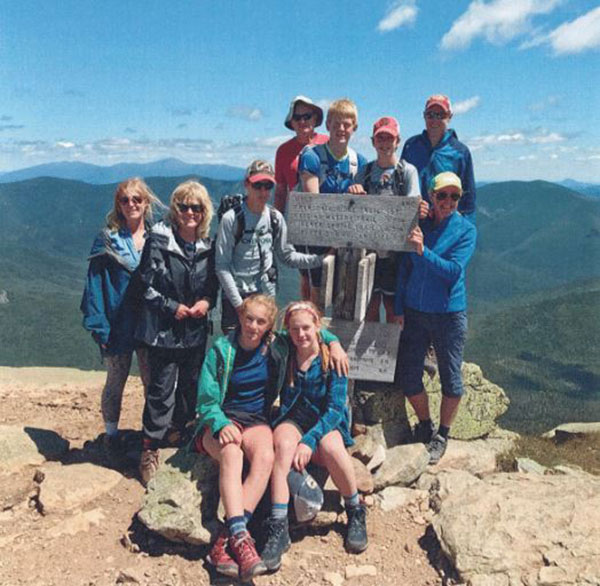
Pass It On!
NRCM’s online Explore Maine map offers a wide variety suggestions for places to explore. Find six that would be great to take the children and young adults in your life and plan your adventures together.







